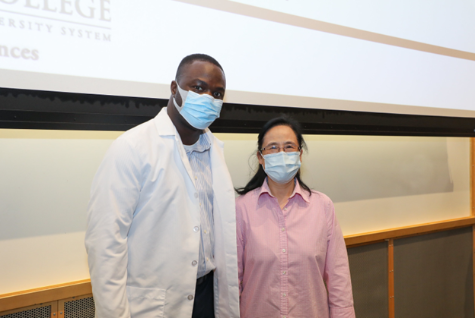Plant compound shows promise for alleviating food allergies
The Research was Recently Presented at the American Society for Biochemistry and Molecular Biology Annual Meeting

With nearly 10 percent of the world population affected by food allergies — which are sometimes life-threatening — new treatments are critically needed. Researchers in the lab of Xiu-Min Li, M.D, M.S., professor of pathology, microbiology and immunology and otolaryngology have found that the plant compound formononetin has great potential to treat food allergies. Found in plants and herbs such as red clover and green beans, formononetin is a phytoestrogen, which can bind to the body’s estrogen receptors, and has been shown to have anticancer properties.
“Our findings show that formononetin is a particularly good therapeutic candidate for treating food allergies,” said Ibrahim Musa, M.S. a doctoral candidate in Dr. Li’s lab. “Our research also revealed new mechanisms and targets that can be utilized to design future drugs for treating food allergies and other allergic disorders or to prevent severe anaphylaxis seen in allergic diseases.” Musa presented the research at the American Society for Biochemistry and Molecular Biology annual meeting in April and the manuscript was recently accepted for publication in the FASEB Journal.
Food allergies occur when the immune system treats a food or something in a food as a threat. This causes the immune system to produce immunoglobulin E (IgE) antibodies that react to the food and can cause allergy symptoms, including hives, asthma, itching, trouble breathing or diarrhea.
In previous studies, the NYMC researchers identified formononetin as a potential therapeutic for allergies because it decreased IgE production. To find out more, the researchers turned to an approach known as systems pharmacology, which involves using data from publicly available databases to identify gene and protein targets regulated in food allergy and mast cells diseases. Mast cells also play an important role in IgE-mediated allergic diseases.
Once they identified gene and protein targets, the researchers validated them using cultured cell lines that are commonly used in allergy studies. These cell experiments showed that formononetin did influence the expression of gene and protein targets identified using systems pharmacology.
“Our study demonstrates that system pharmacology can be used to predict drug/ compound–target interaction,” said Mr. Musa. “What’s more, the mechanism of action identified for formononetin is also important for other allergic diseases, such as allergic asthma and hay fever. This suggests that formononetin or other therapeutic candidates that decrease IgE production could be useful for treating these diseases.”
